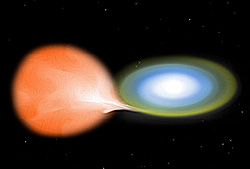Last Wednesday (the 14th of August) an amateur Japanese astronomer discovered a nova. According to Space.com it's visible with binoculars or if conditions are right (clear, dark sky) the naked eye.
A nova is when matter (mostly hydrogen) orbiting being sucked off a star into a near-by white dwarf starts to undergo fusion in a run-away reaction. These are not uncommon events (about 10 per year visible in our galaxy) but not often visible to the naked eye. There are star maps to locate it on this page.
The word "nova" for an explosion of stellar matter is interesting and part of how astronomy has evolved. The word "nova" is Latin for "new." When Tycho Brahe saw a nova in the 16th Century he thought it was a "new star" and called it a stella nova. And then when scientists found out what a "nova" was (i.e., not a new star) they still kept the old term.
Astronomy is full of these kinds of things. "Planet" comes from Greek for "wanderer" because, unlike the "fixed" stars (as the ancients believed), the planets wandered about the night sky. "Comet" comes from the Greek for "long hair." "Asteroid" comes from the Greek for "star like" because when they were first discovered no one knew what they were, just that they appeared star like in their telescopes.
I suspect other sciences have these linguistic quirks. Let me know in the comments if you know of any in your discipline in the comments.


No comments:
Post a Comment